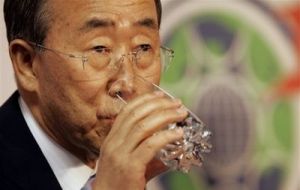MercoPress. South Atlantic News Agency
Unsafe water kills more people than war, Ban says on World Day
 Secretary-General Ban Ki-moon
Secretary-General Ban Ki-moon More people die from unsafe water than from all forms of violence, including war, Secretary-General Ban Ki-moon said Monday, calling for better protection and sustainable management of one of the Earth’s most precious resources on the occasion of World Water Day.
“These deaths are an affront to our common humanity, and undermine the efforts of many countries to achieve their development potential,” Mr. Ban said in his message for the Day, which this year focuses on “Clean Water for a Healthy World” as its theme.
“Our growing population’s need for water for food, raw materials and energy is increasingly competing with nature’s own demands for water to sustain already imperilled ecosystems and the services on which we depend,” he noted.
“Day after day, we pour millions of tons of untreated sewage and industrial and agricultural waste into the world’s water systems. Clean water has become scarce and will become even scarcer with the onset of climate change,” added the Secretary-General.
In his message, Mr. Ban highlighted that water is vitally linked to all UN development goals, including maternal and child health and life expectancy, women’s empowerment, food security, sustainable development and climate change adaptation and mitigation.
As such, the General Assembly recognized 2005-2015 as the International Decade for Action “Water for Life.”
In doing so, it called for a greater focus on water-related issues at all levels and for the implementation of water-related programmes to achieve internationally agreed upon goals, including the Millennium Development Goals (MDG) – an agenda for poverty reduction agreed to by world leaders in 2000.
The Secretary-General said that the poor “continue to suffer first and most from pollution, water shortages and the lack of adequate sanitation,” even while world leaders have the “know-how to solve these challenges and become better stewards of our water resources.”
In order to address these gaps and with the looming 2015 deadline to fulfil the MDG, the UN will host a high-level thematic debate in September to coincide with the opening of the Assembly’s annual General Debate in New York.
The Secretary-General has called on Member States to approve and incorporate an accelerated action plan during the summit, saying an inability to meet the MDG would be an “unacceptable failure, moral and practical.”
Every day around the world, 2 million tons of sewage and industrial and agricultural waste are poured in the earth’s waters, while one child under the age of five dies every 20 seconds from water-related diseases, according to the UN Environment Programme, UNEP.
In a new report, the agency points out that an investment of 20 million USD in low-cost water technologies, such as drip irrigation and treadle pumps, could potentially lift 100 million poor farming families out of extreme poverty.
The publication, entitled, Clearing the Waters: A focus con Water Quality Solutions, found that repairing leaky water and sewage networks can not only secure water supplies, but also lower pollution and boost employment.
In some poorer nations, more than half of treated water is lost to leaks, but by some estimates, saving just half of the water could benefit 90 million people without additional investment.
“Human activity over the past 50 years is responsible for unprecedented pollution, and the quality of the world’s water resources is increasingly challenged,” said UNEP Executive Director Achim Steiner.
“It may seem like an overwhelming challenge but there are enough solutions where human ingenuity allied to technology and investments in nature’s purification systems – such as wetlands, forests and mangroves – can deliver clean water for a healthy world.”




Top Comments
Disclaimer & comment rules-

Read all commentsBut water does not make good press..
Mar 23rd, 2010 - 09:10 am 0Commenting for this story is now closed.
If you have a Facebook account, become a fan and comment on our Facebook Page!